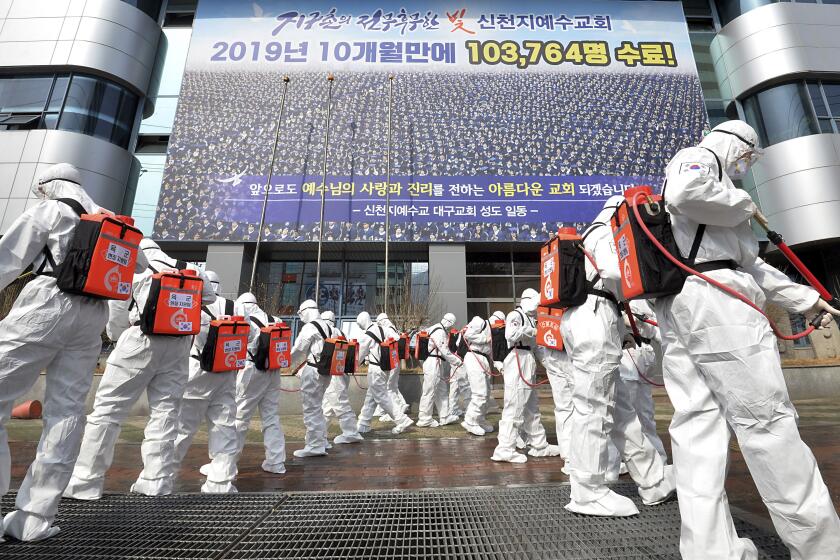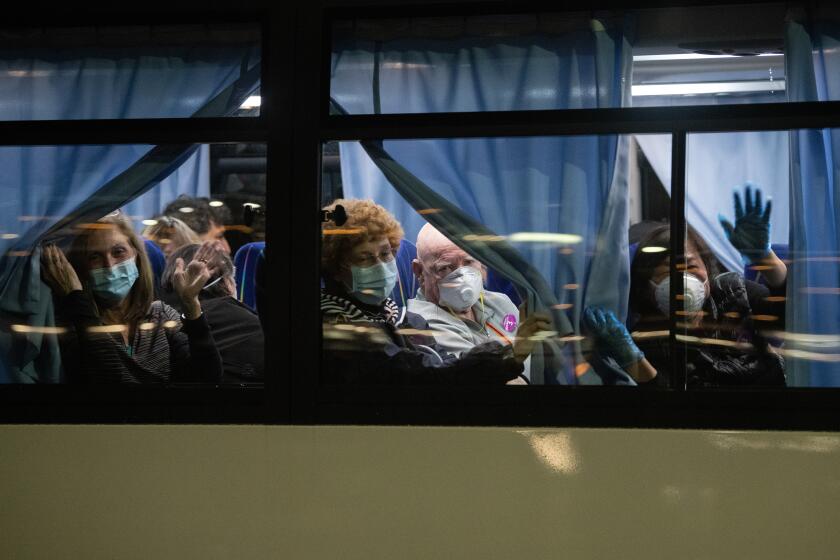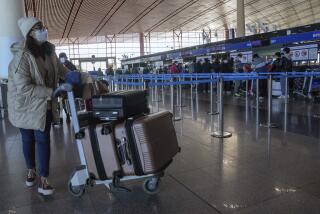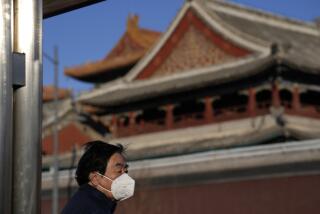Coronavirus alarms sound worldwide, but China sees crisis ebbing
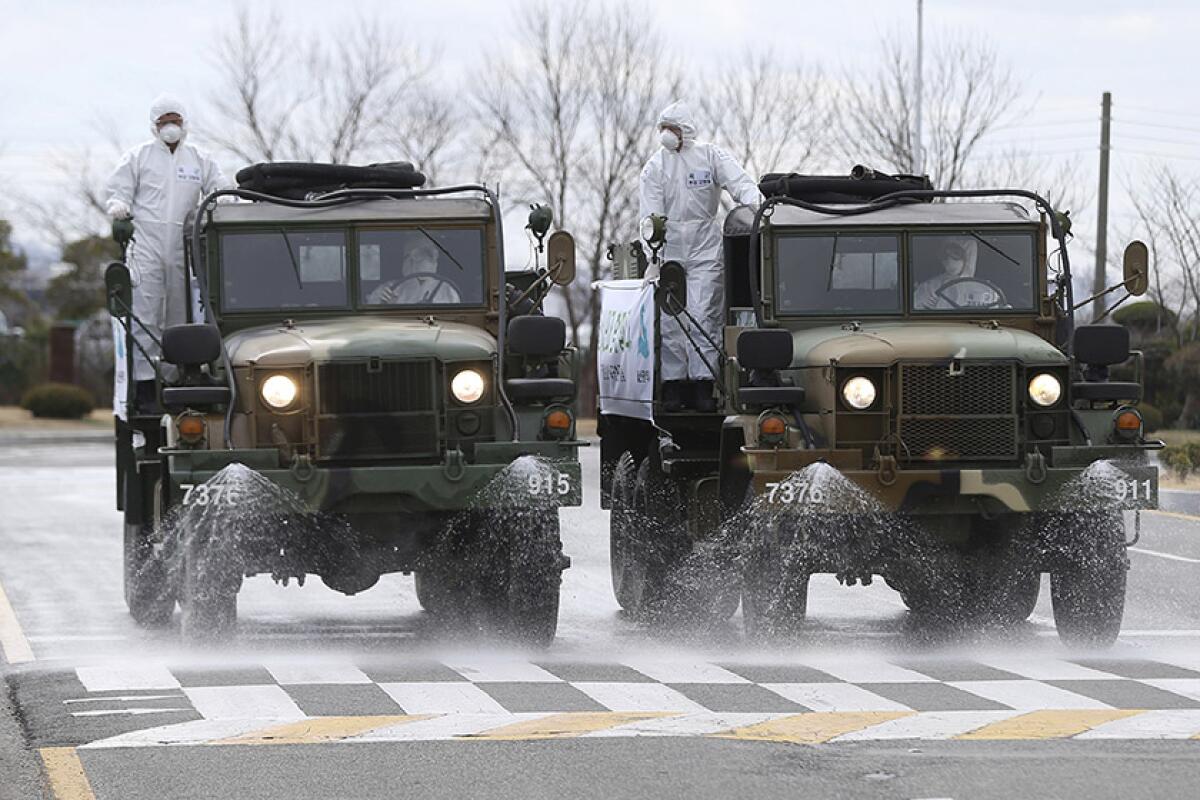
- Share via
BEIJING — The coronavirus crisis shifted increasingly westward toward Europe and the United States on Tuesday, with governments taking emergency steps to ease shortages of face masks for front-line doctors and nurses and the U.S. Federal Reserve announcing the biggest interest rate cut in over a decade to fend off damage to the economy.
The virus reached deep into Iran’s government, where 23 members of Parliament and the head of the country’s emergency services were reported infected. South Korea started drive-through testing. Deaths in Italy more than doubled from the day before, bringing the country’s total to 79.
The French government announced it would requisition supplies of protective masks, while the U.S. relaxed restrictions on the kind of masks American healthcare workers can use.
“We are concerned that countries’ abilities to respond are being compromised by the severe and increasing disruption to the global supply of personal protective equipment, caused by rising demand, hoarding and misuse,” said the World Health Organization’s director-general, Tedros Adhanom Ghebreyesus. “We can’t stop COVID-19 without protecting our health workers.”
The mushrooming outbreaks contrasted with optimism in China, where thousands of recovered patients were going home and the number of new infections dropped to the lowest level in several weeks.
Virus clusters in the United States led schools and subways to sanitize, quickened the search for a vaccine and spread fears among nursing home residents, who are especially vulnerable.
On Wall Street, stocks briefly rose on news of the Fed’s rate cut, then slumped badly again as uncertainty lingered over how much economic damage the virus will cause. Fed Chairman Jerome Powell said the virus “will surely weigh on economic activity both here and abroad for some time.”
The U.S. count of COVID-19 cases topped 100, scattered over several states. Six people have died, all in Washington state.
Other Group of 7 countries appeared reluctant to follow suit with their own cuts, probably because many of their interest rates are already near or below zero.
The U.S. Food and Drug Administration gave healthcare workers the OK to use an industrial type of respirator mask often used to protect construction workers from dust and debris. The masks, which have a close fit and filter out 95% of particles, are also frequently used to stop the spread of bacteria in hospitals and operating rooms.
Iran’s supreme leader ordered the military to assist health officials in fighting the virus, which authorities said has killed 77 people. Among the dead are a confidant of Ayatollah Ali Khamenei, Iran’s former ambassador to the Vatican and a recently elected member of Parliament.
Iran’s judiciary chief, Ebrahim Raisi, said some people are stockpiling medical supplies for profit and urged prosecutors to show no mercy.
“Hoarding sanitizing items is playing with people’s lives, and it is not ignorable,” he said.
In Spain’s Basque region, where at least five doctors and nurses were infected, nearly 100 healthcare workers were being held in isolation and at least 120 were being monitored.
France’s president announced the government will take control of current and future stocks of face masks to ensure they could go to health workers and coronavirus patients, and the finance minister warned that binge-shopping for household essentials could trigger shortages.
“In this period we’re going through — we have entered a phase that will last weeks and, undoubtedly, months — it is indispensable to have clarity, resilience, sangfroid and determination to stop the epidemic” French President Emmanuel Macron said during a visit to the government’s virus crisis center.
South Korea saw its largest daily increase in new cases Tuesday, with 851 more infections reported, largely in and around the southeastern city of Daegu. In all, 5,186 in South Korea have tested positive for the virus.
Korean religious sect with high coronavirus rate values secrecy
In the capital of Seoul, drive-through virus testing centers began operating, with workers dressed head-to-toe in white protective suits leaning into cars with mouth swabs, a move meant to limit contact with possible carriers of the illness. Troops were also dispatched across the city to spray streets and alleys with disinfectant.
Worldwide, more than 92,000 people have been sickened and 3,100 have died. The number of countries hit by the virus has reached at least 70, with Ukraine and Morocco reporting their first cases. More than half of those infected have recovered from the illness already.
How much power do states and the federal government have to quarantine people or dictate other types of behavior to help prevent the spread of COVID-19?
In China, the count of new cases dropped again Tuesday, with just 125 reported. It is still by far the hardest-hit country, with over 80,000 infections and about 95% of the world’s deaths.
“We scrutinized this data and we believe this decline is real,” said WHO outbreak expert Maria Van Kerkhove, who traveled to China as part of a team from the U.N. agency. She said the extraordinary measures taken there, including the lockdown of more than 50 million people, had a significant effect on the direction of the outbreak.
“We believe that a reduction of cases in other countries, including Italy, Korea, Iran, everywhere, that this is possible,” she said.
California has recorded at least 157 cases of COVID-19, including four deaths, in more than a dozen counties.
China’s ambassador to the United Nations said the country is winning its battle against COVID-19. “We are not far from the coming of the victory,” Zhang Jun said.
In the U.S., Capitol Hill aides said negotiations are nearing completion on an emergency bill to fund the development of a vaccine and offer disaster loans to businesses hurt by the crisis.
Surgeon General Jerome Adams, a leading public health official in the U.S., urged calm: “Caution, preparedness, but not panic.”
In Japan, questions continued to build about the fate of the Olympics.
The country’s Olympic minister, Seiko Hashimoto, said Japan is “making the utmost effort” to proceed with the Games’ opening on July 24 in Tokyo. But she told parliament that the country’s contract with the International Olympic Committee specifies only that the Games be held in 2020, meaning they could be postponed to later in the year if necessary.
More to Read
Sign up for Essential California
The most important California stories and recommendations in your inbox every morning.
You may occasionally receive promotional content from the Los Angeles Times.
